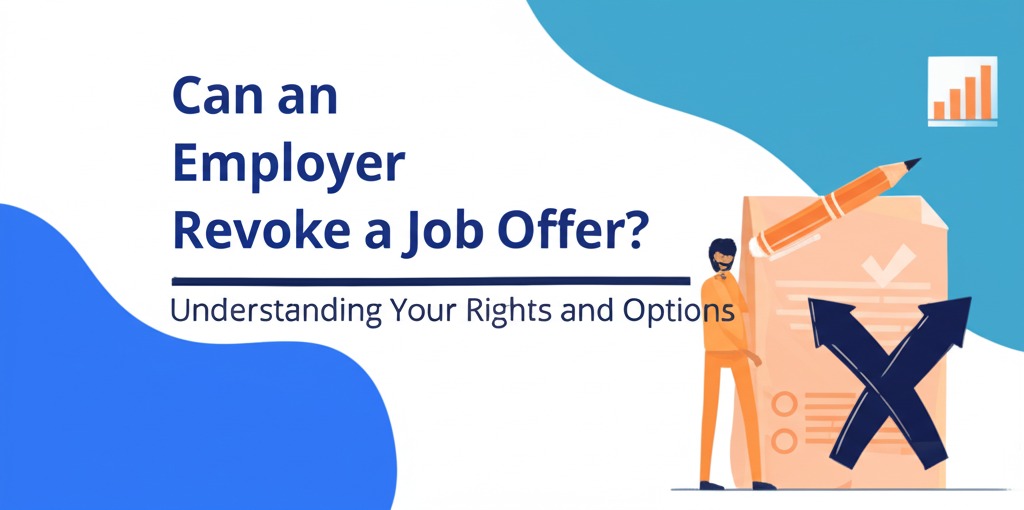
When you receive a job offer, it can feel like the end of a long journey, but what happens if that offer is suddenly revoked? This situation may leave you confused, frustrated, and wondering about your rights. In this article, we will explore whether an employer can legally withdraw a job offer, the reasons why this might happen, and how you can protect yourself. By the end of this guide, you’ll have a clearer understanding of your options and the steps you can take if you find yourself in this predicament.
Table of Contents
- What Does it Mean to Have a Job Offer Revoked?
- Can an Employer Legally Revoke a Job Offer?
- Employment At-Will
- When a Job Offer is Conditional
- Why Would an Employer Revoke a Job Offer?
- Changes in Company Circumstances
- Background Check or References
- Misrepresentation or Fraud
- What Are Your Rights If a Job Offer is Revoked?
- Legal Recourse
- How to Handle the Situation
- How to Prevent a Job Offer From Being Revoked
- Be Transparent and Honest
- Follow Through with All Pre-Employment Checks
- Conclusion: What You Can Do Next
What Does it Mean to Have a Job Offer Revoked?
A job offer being revoked means that an employer has decided to withdraw the offer they previously extended to you. This could happen before you start the job or after you’ve already accepted it. The withdrawal can come as a shock, especially after you’ve resigned from your current job or made major life decisions based on the offer.
Understanding the circumstances surrounding a revoked offer is important, as it can affect your next steps and your career trajectory.
Can an Employer Legally Revoke a Job Offer?
Employment At-Will
In many regions, especially in the United States, employment is “at-will.” This means that, in the absence of a formal contract, an employer can terminate or withdraw an offer for any reason (as long as it isn’t discriminatory or otherwise illegal). Essentially, at-will employment gives both the employee and the employer the flexibility to change their minds, even after a job offer is made.
However, there are certain exceptions, and understanding them can help you navigate a revoked job offer.
When a Job Offer is Conditional
Sometimes a job offer is contingent on specific conditions, such as passing a background check or providing references. If the offer is withdrawn due to failure to meet these conditions, it is generally legal. For example, if an employer revokes an offer because a criminal background check reveals something unexpected, they are within their legal rights to do so.
If the offer was contingent on certain conditions that you knew about, the revocation may be a result of those conditions not being met.
Why Would an Employer Revoke a Job Offer?
Several reasons could lead to an employer deciding to revoke a job offer. Here are a few common situations:
Changes in Company Circumstances
Business needs can change suddenly. For instance, a company might decide to delay hiring due to economic conditions, budget cuts, or restructuring. In such cases, an employer may withdraw an offer if the company no longer needs the position filled immediately.
Background Check or References
One of the most common reasons for a job offer being revoked is failure to pass background checks or issues with references. If the employer finds discrepancies or problematic information that wasn’t disclosed earlier, they may rescind the offer. Always ensure you are honest and clear about your past when applying for jobs.
Misrepresentation or Fraud
If an employer discovers that you lied or misrepresented information during the hiring process, they may revoke the offer. This includes falsifying your resume, exaggerating your qualifications, or providing false references. Honesty is crucial in the job application process, as dishonesty can have long-lasting consequences.
What Are Your Rights If a Job Offer is Revoked?
Legal Recourse
In most cases, an employer can legally revoke a job offer, especially if the offer was made without a contract. However, there are exceptions. For example, if the revocation is based on discrimination or violates a state or federal law (such as revoking an offer due to race, gender, or disability), you may have legal grounds to pursue action.
If you feel that the revocation was discriminatory or illegal, consulting with an employment lawyer could help you understand your options.
How to Handle the Situation
If your job offer is revoked, here’s what you can do:
- Stay Calm: While this situation may be frustrating, try to keep a level head and understand the employer’s perspective.
- Ask for an Explanation: Politely request feedback from the employer. Understanding why the offer was revoked can help you address any issues in the future.
- Look for Alternative Opportunities: Don’t let a revoked offer derail your job search. There are other employers out there, and new opportunities may be just around the corner.
How to Prevent a Job Offer From Being Revoked
While some factors may be beyond your control, there are steps you can take to minimize the chances of a job offer being rescinded:
Be Transparent and Honest
Always provide accurate information about your qualifications, background, and experience. Transparency builds trust with potential employers and helps avoid any surprises later.
Follow Through with All Pre-Employment Checks
Ensure that you complete all required pre-employment tasks, such as background checks and reference verifications, promptly and accurately. If there are any issues or delays, communicate openly with the employer to resolve them.
Conclusion: What You Can Do Next
Having a job offer revoked can be disappointing, but understanding your rights and options is the first step toward moving forward. Remember that employers can legally revoke offers in certain situations, but if you feel the revocation is unjust, there may be legal recourse available. Moving forward, always be transparent and ensure that you meet all conditions of the offer to avoid complications.
If you find yourself in a similar situation, take action by reaching out for clarity and starting your job search again. The right opportunity is out there, and this setback may simply be a step toward a better fit.

Andre Cuevas provides career insights, job search strategies, and professional advice to help individuals navigate the job market and achieve their career goals.






